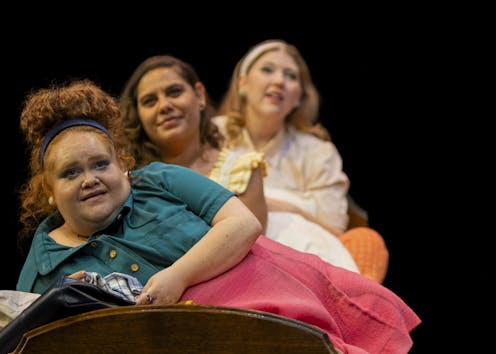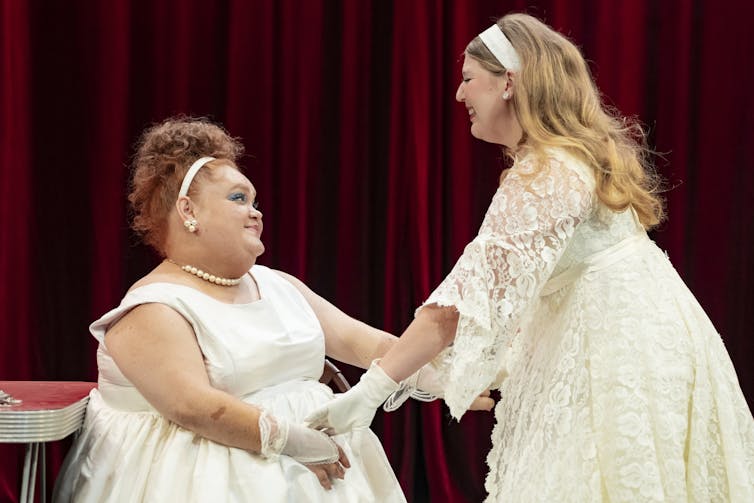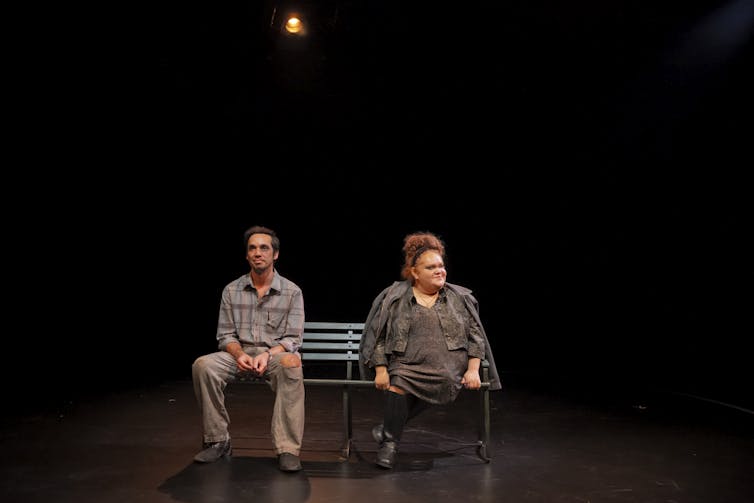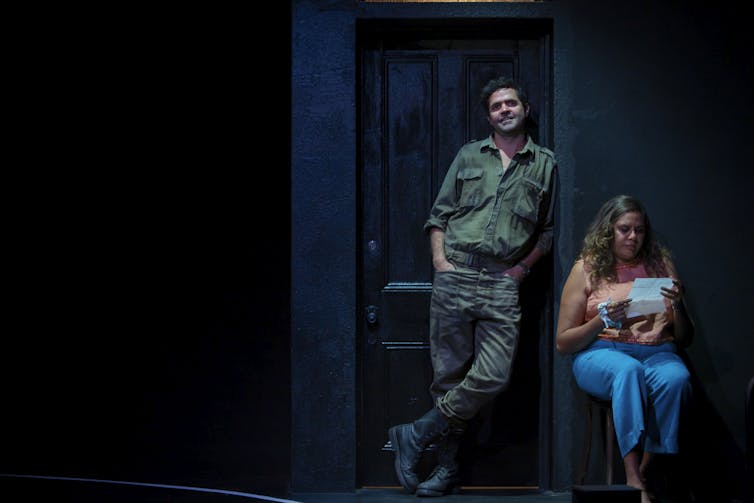 Stephen Wilson Barker/Belvoir
Stephen Wilson Barker/BelvoirWith Big Girls Don’t Cry, Gumbaynggirr/Wiradjuri playwright Dalara Williams proves herself to be a formidable talent.
Cheryl (Williams), Queenie (Megan Wilding) and Lulu (Stephanie Somerville) are three best friends who share a house together in 1960s Redfern, the heart of “Blak Sydney”, after moving from the bush to the city.
The trio swap outfits, go out dancing, socialise and talk about boys while navigating low-paying jobs, curfews and police brutality. Directed by Ian Michael, Big Girls Don’t Cry sits against a backdrop of political moments from service in the Vietnam War, to the 1965 Freedom Rides, the 1966 Wave Hill Walk Off and the 1967 Referendum.
Pride and resilience
The second act sees the girls prepare for the 1966 Aboriginal Debutante Ball at Paddington Town Hall.
Their excitement and anticipation are palpable.
 The girls prepare for the 1966 Aboriginal Debutante Ball.
Stephen Wilson Barker/Belvoir
The girls prepare for the 1966 Aboriginal Debutante Ball.
Stephen Wilson Barker/Belvoir
The ball represents more than just a social event: it is a symbol of pride, resilience and cultural celebration. It serves as a powerful reminder of the community’s strength and unity, showcasing their determination to preserve and honour their heritage amid adversity.
Meticulous attention to detail in the set (Stephen Curtis) and costume design (Emma White) transports us back to this pivotal moment in history, making it feel both authentic and immersive.
Each character’s wardrobe reflects their personality. Debutante dresses and accessories add depth to the characters and their stories, making the visual elements not only historically accurate but also emotionally resonant.
Genuine and moving
Williams’ darker and more confronting scenes are expertly juxtaposed with love stories and hilarious laugh-out-loud moments, particularly from the exceptional Wilding, who wholeheartedly embodies her fierce and outspoken character Queenie.
Williams captivates with her nuanced portrayal of Cheryl, balancing strength and vulnerability. Somerville adds a layer of tenderness and hope as Lulu. The chemistry between these three actors is undeniable. Their friendship is genuine and moving.
Guy Simon’s portrayal of Cheryl’s brother Ernest is a true highlight. While Cheryl strives to keep him out of trouble for his outspoken views, Ernest’s passion for justice and equality is inspiring.
 Guy Simon and Megan Wilding are stand-outs among an exceptional cast.
Stephen Wilson Barker/Belvoir
Guy Simon and Megan Wilding are stand-outs among an exceptional cast.
Stephen Wilson Barker/Belvoir
Ernest’s relationship with Milo (Nic English) highlights the solidarity and camaraderie among activists of the time.
Cheryl’s boyfriend Michael (Mathew Cooper), though physically absent from the group for much of the play, is a constant presence in Cheryl’s thoughts. His letters from Vietnam add a poignant layer to the narrative.
Officer Robinson (Bryn Chapman Parish) is a chilling reminder of the systemic racism and oppression faced by the Indigenous community. His menacing presence serves as a stark contrast to the warmth and joy shared by the main characters, highlighting the harsh realities of this era.
By the end of the play, I felt involved in the lives of these characters, and as though I knew them – a credit to Williams’ writing and the phenomenal portrayal by each of the seven cast members.
Continuing the fight
The program includes a beautiful and personal reflection by Williams where she describes her family legacy as a major source of inspiration for the play.
The various interwoven love stories are some of the most heart-wrenching, comical and sweetest moments of the play. But to solely describe it as a romantic comedy is to devalue the power of this work.
Williams describes how she is from a long line of staunch Blak advocates who have continued to fight for sovereignty. This play is just the latest in her family’s long lineage of demonstrating resilience and survival.
 This play is just the latest in Williams’ long lineage of demonstrating resilience and survival.
Stephen Wilson Barker/Belvoir
This play is just the latest in Williams’ long lineage of demonstrating resilience and survival.
Stephen Wilson Barker/Belvoir
Williams does not shy away from the reality of being Aboriginal in 1960s Redfern and handles moments with sophistication and grit. Scenes of police brutality and overt racial discrimination are portrayed with a raw honesty that is both confronting and enlightening.
Big Girls Don’t Cry should be essential viewing as part of ongoing education efforts to truly highlight the reality of life at this time – many such struggles which continue today.
The play is a powerful and moving tribute to the strength and resilience of Indigenous women. It is a celebration of their lives, their struggles, and their triumphs.
Williams has crafted a play that is not only entertaining but also deeply meaningful, shedding light on a crucial period in Australian history: a must-see for anyone interested in understanding the complexities of the past and the ongoing fight for justice and equality.
While much has changed since 1966, the spirit of resistance and the quest for a better future remain as vital as ever.
Big Girls Don’t Cry is at Belvoir Theatre, Sydney, until April 27.
Laura Case does not work for, consult, own shares in or receive funding from any company or organisation that would benefit from this article, and has disclosed no relevant affiliations beyond their academic appointment.

 1 month ago
304
1 month ago
304 
















 English (United States) ·
English (United States) ·